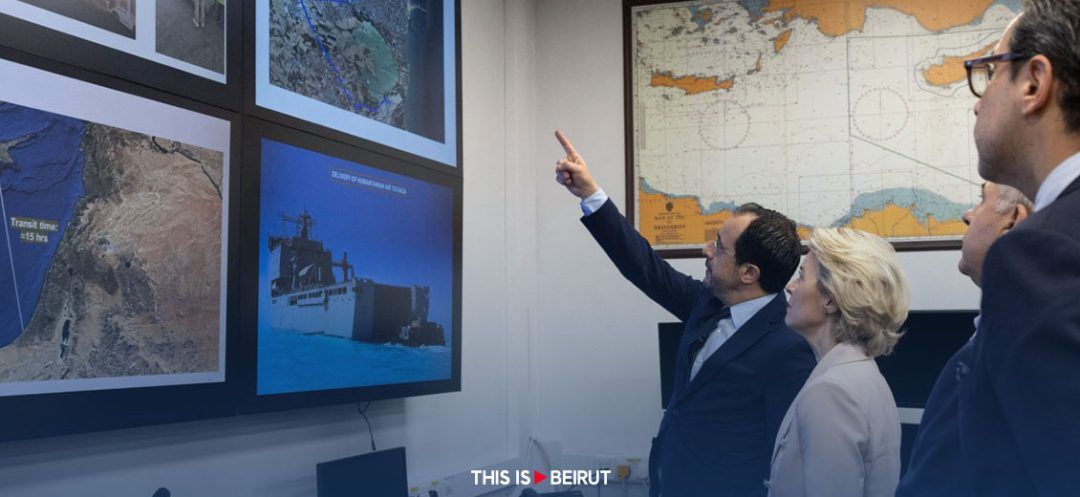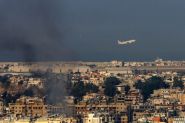- Home
- War in the Middle East
- Western Plans for a Maritime Aid Corridor to Gaza Gather Pace

©(Stavros IOANNIDES, AFP)
The US announced on Friday, March 8, that it would set up a humanitarian corridor from Cyprus to bring aid to the starving Gaza Strip, which is under constant Israeli bombardment. The EU also joined the effort.
The United States plans to gather pace on Friday to get aid by sea into Gaza, where the UN has repeatedly warned of famine and Israel has been accused of limiting aid as it battles Hamas militants.
In his annual State of the Union address to Congress, President Joe Biden said the US military would "lead an emergency mission to establish a temporary pier in the Mediterranean on the coast of Gaza that can receive large shipments carrying food, water, medicine, and temporary shelters."
Senior administration officials said this effort builds on an initiative proposed by Cyprus for a maritime aid corridor. In the Cypriot port of Larnaca on Friday, European Union chief Ursula Von der Leyen expressed hope the corridor could open this Sunday.
"We are very close to opening this corridor, hopefully this Sunday," von der Leyen said following a visit to the Cypriot port of Larnaca with Cyprus's President Nikos Christodoulides.
Von der Leyen described the situation in Gaza as "dire... and we face a humanitarian catastrophe".
She said "an initial pilot operation" would be launched on Friday, and the United Arab Emirates had helped activate the corridor "by securing the first of many shipments of goods to the people of Gaza".
The European Commission issued a joint statement with Cyprus, the UAE, United States and United Kingdom "endorsing the activation" of the maritime aid corridor to Gaza.
The United States and other countries have already been parachuting food and other assistance into Gaza, but air or sea delivery is not the best way, said Sigrid Kaag, the United Nations aid coordinator for the Palestinian territory.
"The diversification of the supply routes via land" remains the optimal solution, Kaag said.
Biden, whose administration has been increasingly vocal about the war's consequences for civilians, delivered some of his strongest comments yet as hopes dimmed for a new truce before Ramadan, the Muslim holy month that could begin Sunday depending on the lunar calendar.
"To the leadership of Israel, I say this: humanitarian assistance cannot be a secondary consideration or a bargaining chip," said Biden, whose country provides billions of dollars in military aid to Israel.
The war in Gaza began after Hamas's unprecedented October 7 attack on southern Israel, which resulted in about 1,160 deaths, most of them civilians, according to Israeli figures.
Israel has responded with a relentless bombardment, alongside a ground offensive, that the Ministry of Health in Hamas-run Gaza said has killed at least 30,878 people, mostly women and children.
It said the latest toll includes 78 fatalities over the previous 24 hours.
US officials said a "number of weeks" would be required before aid deliveries to the planned port could begin, but they said the administration would not "be waiting on the Israelis."
The temporary port will feature a pier that will "provide the capacity for hundreds of additional truckloads of assistance each day," a senior Biden administration official said.
The United Nations has cited "access constraints" as among the factors limiting essential water and other services.
The situation is particularly acute in Gaza's north, where residents have been forced to eat animal fodder and even leaves.
Veteran aid worker Jean-Pierre Delomier, who has responded to disasters worldwide for decades, said the war in Gaza is by far "the worst."
"I saw kilometers (miles) of trucks queueing on four lanes, all waiting to get into Gaza" from Egypt, Delomier, 61, told AFP in France after eight days in Gaza for Handicap International - Humanity & Inclusion (HI).
"Planes fly over to drop a few pallets, whereas just behind (the border) there are kilometers of pallets waiting that could just be let in," he said.
Desperate Gazans have swarmed the aid trucks that do make it into the territory.
The United States plans to gather pace on Friday to get aid by sea into Gaza, where the UN has repeatedly warned of famine and Israel has been accused of limiting aid as it battles Hamas militants.
In his annual State of the Union address to Congress, President Joe Biden said the US military would "lead an emergency mission to establish a temporary pier in the Mediterranean on the coast of Gaza that can receive large shipments carrying food, water, medicine, and temporary shelters."
Senior administration officials said this effort builds on an initiative proposed by Cyprus for a maritime aid corridor. In the Cypriot port of Larnaca on Friday, European Union chief Ursula Von der Leyen expressed hope the corridor could open this Sunday.
'Humanitarian catastrophe'
"We are very close to opening this corridor, hopefully this Sunday," von der Leyen said following a visit to the Cypriot port of Larnaca with Cyprus's President Nikos Christodoulides.
Von der Leyen described the situation in Gaza as "dire... and we face a humanitarian catastrophe".
She said "an initial pilot operation" would be launched on Friday, and the United Arab Emirates had helped activate the corridor "by securing the first of many shipments of goods to the people of Gaza".
The European Commission issued a joint statement with Cyprus, the UAE, United States and United Kingdom "endorsing the activation" of the maritime aid corridor to Gaza.
The United States and other countries have already been parachuting food and other assistance into Gaza, but air or sea delivery is not the best way, said Sigrid Kaag, the United Nations aid coordinator for the Palestinian territory.
"The diversification of the supply routes via land" remains the optimal solution, Kaag said.
Biden, whose administration has been increasingly vocal about the war's consequences for civilians, delivered some of his strongest comments yet as hopes dimmed for a new truce before Ramadan, the Muslim holy month that could begin Sunday depending on the lunar calendar.
"To the leadership of Israel, I say this: humanitarian assistance cannot be a secondary consideration or a bargaining chip," said Biden, whose country provides billions of dollars in military aid to Israel.
Trucks queueing
The war in Gaza began after Hamas's unprecedented October 7 attack on southern Israel, which resulted in about 1,160 deaths, most of them civilians, according to Israeli figures.
Israel has responded with a relentless bombardment, alongside a ground offensive, that the Ministry of Health in Hamas-run Gaza said has killed at least 30,878 people, mostly women and children.
It said the latest toll includes 78 fatalities over the previous 24 hours.
US officials said a "number of weeks" would be required before aid deliveries to the planned port could begin, but they said the administration would not "be waiting on the Israelis."
The temporary port will feature a pier that will "provide the capacity for hundreds of additional truckloads of assistance each day," a senior Biden administration official said.
The United Nations has cited "access constraints" as among the factors limiting essential water and other services.
The situation is particularly acute in Gaza's north, where residents have been forced to eat animal fodder and even leaves.
Veteran aid worker Jean-Pierre Delomier, who has responded to disasters worldwide for decades, said the war in Gaza is by far "the worst."
"I saw kilometers (miles) of trucks queueing on four lanes, all waiting to get into Gaza" from Egypt, Delomier, 61, told AFP in France after eight days in Gaza for Handicap International - Humanity & Inclusion (HI).
"Planes fly over to drop a few pallets, whereas just behind (the border) there are kilometers of pallets waiting that could just be let in," he said.
Desperate Gazans have swarmed the aid trucks that do make it into the territory.
Read more



Comments